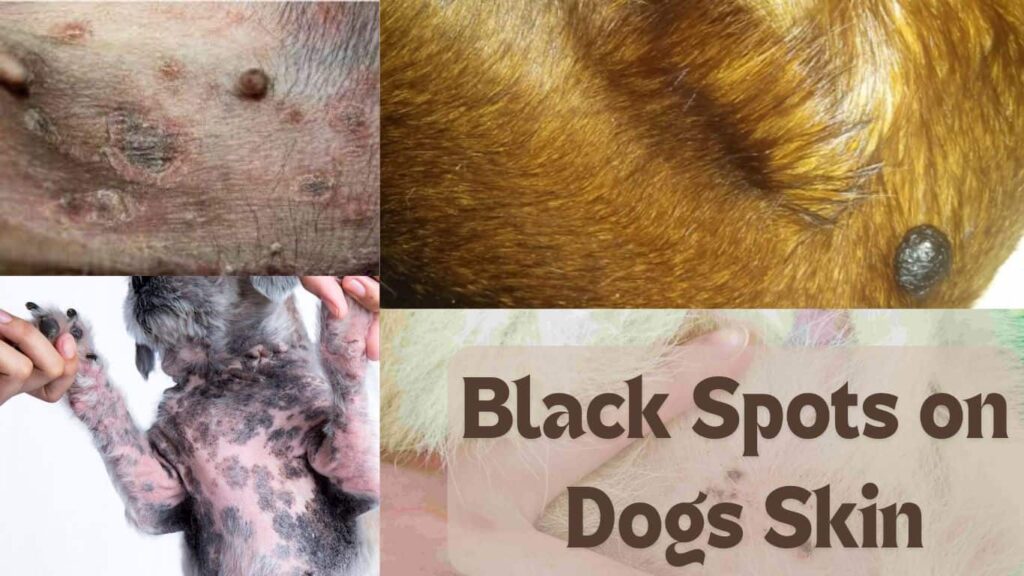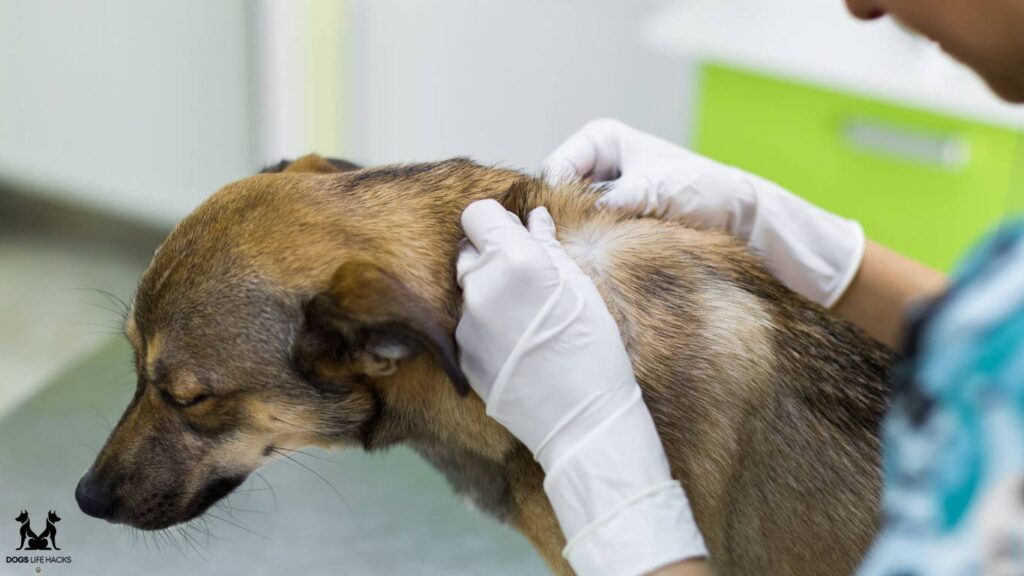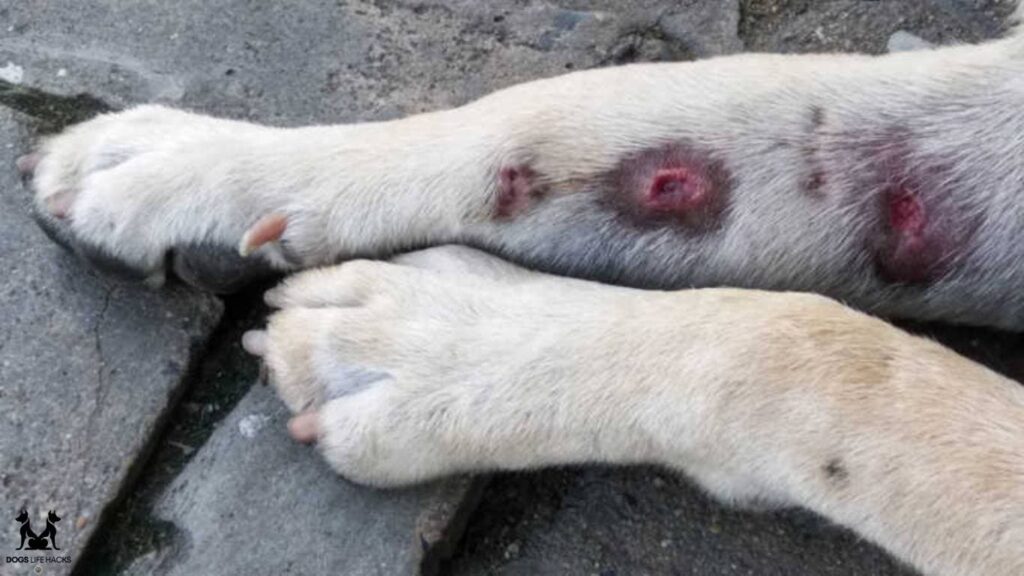How to Cure Black Spots on Dogs Skin | Best Remedies
Black spots on dogs skin can be a matter of concern. The dog owners want to know about its toxicity, and their causes, symptoms, and treatments. In this guide, we will explore everything you need to know about these mysterious spots.

Importance of Understanding Black Spots on Dogs Skin
Understanding skin conditions and allergies is important for ensuring the health of dogs. Dogs use their skin and fur to protect themselves from environmental factors and pathogens. Early diagnosis and treatment can prevent minor problems from escalating into serious health concerns.
Common Causes of Black Spots

Hyperpigmentation
Hyperpigmentation occurs because of excess melanin. It creates dark spots on the skin of dogs. Friction, hormonal changes, or chronic inflammation can result in black spots on dogs skin.
Age Spots
Age spots may develop on the dog’s skin in older dogs. They are not dangerous but should be monitored for any changes.
Fungal Infections
Ringworm is a kind of fungal infection. It can cause dark spots on the skin of dogs. This can cause itching and hair loss around the affected area.
Bacterial Infections
Skin issues or wounds that have become infected by bacterial infections can also result in black spots.
Allergies
Food allergy, environmental allergy, and parasites like fleas or mites can cause dark spots and other skin changes in dogs.
Symptoms and Identification

Visual Identification
Look for any changes in the appearance of the spots by closely examining your dog’s skin.
Changes in Dog Behavior
Excessive scratching, licking, or biting at the affected area are indications that your dog is experiencing discomfort from black spots.
Skin Texture and Appearance
Roughness, scabbing, and changes in appearance like hair loss, can help identify issues related to black spots.
Diagnosing Black Spots

When to Visit the Vet
If you notice a black spot or any other infection and your dog shows signs of irritation. It’s essential to visit the vet for an early diagnosis to prevent complications.
Diagnostic Tests
Diagnostic tests like skin scrapings, biopsies, or blood tests are crucial to determine the underlying cause of the black spots.
Differential Diagnosis
This procedure involves ignoring other potential causes for the symptoms, ensuring the correct condition is identified and treated accordingly.
Preventive Measures
Regular Grooming
Dog’s skin and coat health is maintained by regular grooming. Routine check and grooming can help in early detection of any changes or issues.
Proper Diet
A balanced and nutritious diet supports overall skin health and can prevent many skin conditions.
Avoiding Allergens
Keep the environment clean and avoiding allergens that cause skin reactions in your dog can prevent the development of black spots and other skin issues.
Routine Veterinary Check-ups
Routine visits and consultation with your vet ensure early identification of any potential issues and will be managed effectively.
Treatment Options
Topical Treatments
These include medicated shampoos or ointments, which can help treat black after marks caused by infections or allergies.
Medications
Antibiotics or antifungal drugs may be prescribed to treat infections causing black spots.
Natural Remedies
Coconut oil or aloe vera, can soothe irritated skin and promote healing.
Long-term Care and Management
Some medications can cause black spots and require care and regular monitoring to ensure your dog’s skin remains healthy.
When to Be Concerned
Signs of Serious Conditions
Black spots that change their appearance, or those with other symptoms like swelling or discharge, can indicate serious conditions.
Monitoring Changes Over Time
Monitoring changes in black spots can identify potential issues early, allowing for advanced veterinary attention.
Home Remedies and Care

Safe Home Treatments
Safe home organic treatments like gentle cleansing and applying natural moisturizers can support skin health and give comfort to dogs.
Monitoring Progress
After using home treatments, monitor your dog’s skin for any improvements or worsening of the condition.
When to Seek Professional Help
If home remedies do not show improvement or if the condition worsens or shows side effects, it is crucial to seek professional veterinary help.
Special Considerations for Different Breeds
Breeds Prone to Skin Issues
Bulldogs and Retrievers are more prone to skin issues and require more attentive care.
Tailored Care for Specific Breeds
Treat the dog according to the breed’s nature. This can help maintain their skincare routine to prevent and manage black spots.
Impact of Environment and Lifestyle
Environmental Factors
Temperature and exposure to pollutants can affect your dog’s skin health.
Lifestyle Adjustments
A grooming routine and favorable living conditions can help manage and prevent skin issues.
The Role of Nutrition
Importance of a Balanced Diet
A balanced diet is the key to a healthy life. It provides the necessary nutrients to support healthy skin and prevent dermatological issues.
Supplements for Skin Health
Supplements like omega-3 fatty acids can improve skin health and reduce the likelihood of developing black spots.
Common Myths and Misconceptions
Debunking Popular Myths
Debunking the belief that they are always cancerous, helps in understanding the true nature of these skin changes.
Reliable Sources of Information
Relying on your vet’s advice and reputable sources ensures you get accurate information about your dog’s skin health.
Emotional and Psychological Impact on Dogs
Stress and Anxiety
Skin conditions result in stress and anxiety in dogs, affecting their overall well-being.
Behavioral Changes
Changes in behavior indicate your dog’s discomfort and the need for intervention.
Conclusion
Understanding the reasons, causes, symptoms, and timely treatments of black spots on dogs skin is crucial for maintaining their health.
Regular monitoring, a clean environment, and early veterinary care ensure that your dog remains healthy and comfortable.
FAQs
What does it mean if your dog has black spots on his skin?
There are different reasons for the black spots on his skin:
Hyperpigmentation
Age Spots
Fungal Infections
Bacterial Infections
Allergies
What does black skin disease in dogs look like?
Black skin disease results in thinning hair, and itchy skin followed by bald patches and dark grey skin.
What are the little black specks on my dog?
Black spots on your dog’s skin or fur could possibly indicate flea dirt.
What are the black dots on my dog’s private area?
The black spot on or near the genitals of the dog is a yeast infection.
Explore The World of Dogs
- Meet Super Colorado Mountain Dog | Your Majestic Companion
- Discover Sable English Shepherd Secrets, Breeds & Care Tips
- Why Dog Losing Weight But Eating – Find Shocking Reason!
- My Dog Has Diarrhea But Is Acting Fine – What Should I Do?
- Can Dogs Eat Mackerel? Benefits, Risks & Surprising Truth!
- Can Dogs Get Cavities? Find out Shocking Truth & Treatment
- Is Avocado Oil Bad For Dogs? Discover Cons & Pros & Truth
- Why Is My Dog Chattering Teeth? Shocking Reasons Revealed!
- Can Dogs Have Mct Oil? Benefits & Safe Usage Explained!

One Comment